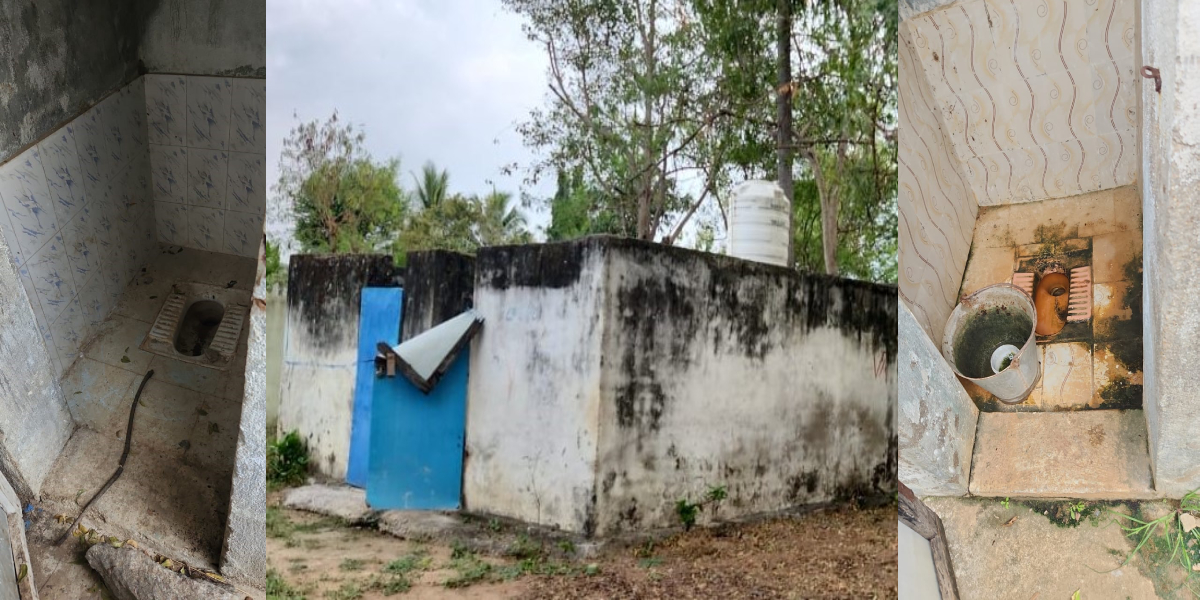Andhra Pradesh and Telangana lead the list of South Indian schools without proper toilet or water facilities; Kerala and TN fare better.

Toilets of the Zilla Parishad High School (ZPHS) in Kamareddi Gudem, Devaruppula Mandal in Warangal. (Supplied)
Thoutam Niharika, a math teacher at the Zilla Parishad High School (ZPHS) at Kamareddi Gudem in Warangal, considers herself privileged and fortunate.
Whenever the teacher wants a washroom visit, she crosses the road in front of the school to a colleague’s house, which has a proper toilet.
Others in the school are not as privileged or fortunate as Niharika. The school has only one open loo that caters to 60-70 girl students.
“The stink is unbearable,” Niharika said. “Other teachers use a toilet without roof besides the loo,” she added.
The loo is cleaned once a week when the sarpanch sends a sanitation worker. “They do not have any cleaning lotion and the stench remains,” the teacher added.
The school has repeatedly requested the authorities to construct proper toilets. “They are waiting for the government’s approval,” Niharika said.
Kamareddi Gudem ZPHS is not an aberration. The same is the case with 25.3 percent of government schools in the five South Indian states. Some do not even have a toilet.
Children spend an average of one-third of their time in schools and 42,398 government schools in the South India lack functional toilets, water taps and drinking water facilities.
The data is from the response Union Education Minister Dharmendra Pradhan tabled in the Rajya Sabha on Wednesday, 7 December. He was replying to a query by Kerala MP PV Abdul Wahab.
The lack of basic facilities could affect the children’s health, education and safety, and even force them to drop out of schools.
Andhra Pradesh and Telangana together accounted for more than 75 percent of schools lacking basic amenities in the southern states.
The data was sourced from the 2022 Unified District Information System for Education Plus (UDISE+), one of the largest management information systems on school education. It falls under the Union Ministry of Education.
Incidentally, taking suo motu cognizance of a news report on the non-functioning toilets for girls, the Telangana High Court on 29 November, directed the State Education Department to submit its response by 1 January, 2023.
The national average of government schools in India without toilet, water tap and drinking facilities is 55.89 percent.
Uttar Pradesh (99,653) has the largest number of government schools without basic facilities in India, followed by Madhya Pradesh with 83,373 schools.
Among the southern states, Andhra Pradesh lacks the basic facility in 17,008 of its 45,137 government schools, while in Telangana, 15,107 schools out of 30,023 do not provide basic facilities to students.
Under the Right to Education (RTE) Act, the Supreme Court, in 2009, ruled that all schools must have separate toilet facilities for boys and girls, and also water for drinking and other purposes.
The states were given a five-year grace period to implement the Act. But several states, including Andhra Pradesh and Telangana, are still lagging.
After Andhra Pradesh and Telangana, 6,053 schools in Karnataka, 2,387 in Kerala and 1,393 in Tamil Nadu are without basic facilities.
Venkat Reddy, national convener of MV Foundation, a Secunderabad-based NGO advocating child rights, said that the budgetary allocation for education in Telangana witnessed a dip after its separation from the unified Andhra Pradesh in 2014.
"Infrastructure has been completely neglected and the approach is centralised. A state secretary decides how many toilets a village school should have. Funds for education needs to be increased, and the decision-making power should be decentralised and funds should be devolved to the panchayats," Venkat, who is also a member of Hyderabad based non-profit Social Democratic Forum (SDF) run by retired IAS Murali Akunuri, told South First.
SDF team slept at Jorpur school in Nandipet mandal in Nizamabad Dist . Found that there are no good toilets , no drinking water , bad flooring, bad ceiling, bad walls , broken doors and windows, no benches , no electricity in these schools.(2/3) pic.twitter.com/3MmRhp3Kdj
— Social Democratic Forum - SDF (@sdf4thepeople) January 10, 2022
While noting that the findings of the report as an "education emergency", he said, "It is all about the political will of the government, which is missing. Similarly, its priority is building the secretariat, flyovers, highways, and police command room. It should develop school infrastructure."
"Children from the marginalised families attend the government schools. There is a lack of interest on the government's part. The public should put pressure on the government," he opined.
The UDISE+ statistics revealed that till November this year, as many as 8,980 (21.2 percent) schools — private, government and aided — across Telangana do not have functional toilets for girls.
Telangana has 29,416 government schools for girls. UDISE+ reported 8,663 (29.4 percent) government schools without functioning toilets for girls.
The Telangana High Court observed that while the government calls for ‘Beti Padhao-Beti Bachao’, it does not provide minimum facilities for girls in schools.
Venkat saw it a direct violation of child rights by the state government. "Due to the lack of functional toilets, girls avoid drinking water as there are no toilets and as according to experts, it would lead to several health issues. They even have discontinues school due to this reason."
According to Stats of India, a data visualisation firm, the national average of 5.3 percent (78,584 all management) schools without functional toilets would impact the health of more than 70 lakh girls.
"Across India, 26.5 crore children study in 14.9 lakh schools. If we assume 48% are girl students, 78,000 schools would have an estimated 70 lakh girls affected by a lack of separate functional toilets," it said in a tweet.
What percentage of schools in India don't have a functional Girl's toilet? 5.3% (about 78,854 schools) 😔 pic.twitter.com/8sXJ9OQ1xL
— Stats of India (@Stats_of_India) November 9, 2022

Jul 26, 2024

Jul 26, 2024

Jul 26, 2024

Jul 26, 2024

Jul 26, 2024

Jul 26, 2024